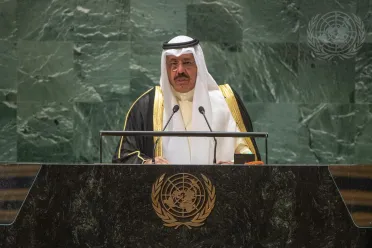Statement
Statement summary
SHEIKH AHMAD NAWAF AL-AHMAD AL-SABAH, Prime Minister of Kuwait, recognized the Sectary-General’s efforts and actions to realize the Organization’s mission, based on the Charter, to maintain peace and security. Multilateralism is facing many obstacles today, which tests the international community’s ability to survive and move forward. These issues include conflicts between States, terrorism, escalating scourges that exacerbate extreme poverty, climate change and food insecurity. There are also new and emerging risks in the cybersphere. International cooperation must be sought. The Secretary-General’s plan, Our Common Agenda, is very important as it diagnoses the situation facing the international community and the challenges that require joint effort at the international, national and regional levels.
For 20 years, Kuwait has believed in being a good neighbour and always worked to help Iraq return to its rightful place in the international community and realize the hopes of its people. He was surprised by the recent ruling by the Iraqi Supreme Federal Court, regarding navigation in the Khor Abdullah waterway between the two States, which invalidated the 2013 agreement governing maritime navigation in the waterway. This agreement was ratified and submitted to the United Nations in 2013. This ruling contains several historic contradictions and will have consequences on maritime security and navigation in the region. Kuwait believes the agreement is important and can help prevent chaos and provide protection from trafficking in arms and narcotics, which are sources of revenue for terrorist groups. He called on the Iraqi Government to urgently take tangible measures to remedy the ruling’s consequences and protect neighbourly relations. Kuwait reserves its right to undertake measures to defend its legal rights and the norms of international law.
Turning to regional issues, he noted the suffering of the Palestinian people for the past 75 years and their endurance under the Israeli occupation. He supported the creation of an independent Palestinian State, with East Jerusalem as its capital. Noting the serious conflict in Sudan, he urged all parties to immediately end hostilities and return to dialogue and peace and demonstrate respect for territorial integrity. He supported the approach of the United States and Saudi Arabia presented at the Jeddah meeting. Regarding Yemen, he supported a peaceful resolution to the country’s difficulties and respect for resolution 2216 (2015). He appealed to Iran to rebuild trust and build a dialogue based on non-interference in external affairs and affirm maritime safety.
Noting the unprovoked attacks that Muslims still face, he supported an international dialogue based on a culture of peace, including international efforts to end hate speech. He noted the “New Kuwait” 2035 development plan, which plans to turn his State into a financial and international hub, and the country’s great strides in the environmental area as it diversifies the country’s energy sources. It is expanding use of renewables forms of energy and aims to ensure carbon neutrality by 2050 in the oil sector. He expects that the upcoming UN Climate Change Conference will be successful and that countries will implement their Paris Agreement commitments. He urged Member States to build equitable solutions based on international humanitarian standards and international law without any selectivity and double standards. He reaffirmed Kuwait’s commitment to multilateralism and goals of the Charter so the United Nations can carry out its mission of maintaining peace and international security.
Full statement
Read the full statement, in PDF format.
Photo

Previous sessions
Access the statements from previous sessions.
